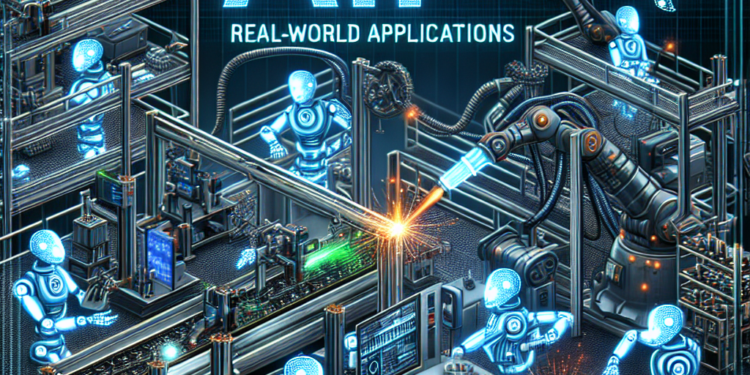Artificial intelligence has revolutionized various industries in recent years, and manufacturing is no exception. The integration of AI technology in manufacturing processes has led to increased efficiency, accuracy, and productivity. From predictive maintenance to quality control, AI is transforming the way manufacturers operate and create products. In this article, we will explore some of the real-world applications of AI in manufacturing and how it is reshaping the industry.
One of the most significant impacts of AI in manufacturing is in predictive maintenance. By analyzing data from sensors and machines, AI algorithms can predict when a machine is likely to fail and alert technicians before any breakdown occurs. This proactive approach to maintenance not only reduces downtime but also extends the lifespan of equipment. Companies like General Electric and Siemens have implemented AI-powered predictive maintenance systems that have resulted in significant cost savings and improved operational efficiency.
Another area where AI is making a big impact in manufacturing is in quality control. Traditionally, quality control involved manual inspection of products which was time-consuming and prone to errors. With AI-powered machine vision systems, manufacturers can now automate the inspection process and detect defects with greater accuracy. These systems can analyze images of products in real-time and identify any anomalies that may affect the quality of the final product. This has helped manufacturers reduce waste and improve overall product quality.
AI is also being used in supply chain management to optimize inventory levels and streamline logistics operations. By analyzing historical data and demand patterns, AI algorithms can predict future demand and suggest optimal inventory levels. This helps manufacturers avoid stockouts and reduce excess inventory, leading to cost savings and improved customer satisfaction. Additionally, AI-powered algorithms can optimize routing and scheduling of deliveries, reducing transportation costs and improving overall efficiency in the supply chain.
In the realm of production planning, AI is being used to optimize production schedules and resource allocation. By analyzing historical data and production constraints, AI algorithms can generate optimal production schedules that minimize downtime and maximize throughput. This helps manufacturers increase production capacity and meet customer demand more efficiently. Companies like Toyota and Ford have implemented AI-powered production planning systems that have improved operational efficiency and reduced lead times.
AI is also being used to enhance product design and innovation in manufacturing. By using generative design algorithms, engineers can explore a vast number of design options and select the best one based on performance criteria. This iterative design process enables manufacturers to create more innovative products that are optimized for performance, cost, and manufacturability. Companies like Autodesk and Siemens have developed AI-powered design tools that have enabled engineers to create groundbreaking products that were previously impossible to design.
In the field of robotics, AI is enabling manufacturers to develop more advanced and flexible automation systems. By combining AI algorithms with robotics, manufacturers can create intelligent machines that can adapt to different tasks and environments. These AI-powered robots can work alongside human workers and collaborate in a seamless manner, leading to increased productivity and efficiency on the factory floor. Companies like ABB and Fanuc have developed AI-powered robotic systems that are transforming the way manufacturing tasks are performed.
AI is also being used in the field of demand forecasting to predict future market trends and consumer behavior. By analyzing data from social media, sales patterns, and other sources, AI algorithms can forecast demand for products and services with greater accuracy. This helps manufacturers adjust production levels and inventory levels to meet customer demand more effectively. Companies like Amazon and Walmart have implemented AI-powered demand forecasting systems that have enabled them to optimize inventory levels and reduce stockouts.
In conclusion, AI is transforming the manufacturing industry in unprecedented ways. From predictive maintenance to quality control, AI is enabling manufacturers to operate more efficiently and create products of higher quality. By harnessing the power of AI technology, manufacturers can optimize their operations, reduce costs, and improve overall competitiveness in the market. The real-world applications of AI in manufacturing are vast and continue to evolve as new technologies and innovations emerge. As AI technology continues to advance, the future of manufacturing looks bright, with limitless possibilities for growth and innovation.













